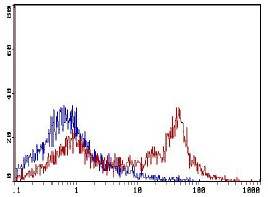Cd226 Rat Monoclonal Antibody [Clone ID: 15F.10E5]
Other products for "Cd226"
Specifications
| Product Data | |
| Clone Name | 15F.10E5 |
| Applications | FC |
| Recommended Dilution | Flow Cytometry. |
| Reactivities | Mouse |
| Host | Rat |
| Isotype | IgM |
| Clonality | Monoclonal |
| Immunogen | AE7 cells Donor: Lewis rat Fusion Partner: SP 2/0 myeloma |
| Specificity | Recent experiments show that this antibody (clone 15F.10E5) only binds to differentiated Th1 cells but not Th2 or Th0 cells. It also suppressed both antigen-specific T cell expansion and an autoimmune disease (EAE) mediated by effector Th1 cells. |
| Formulation | PBS containing 0.02% sodium azide (NaN3) as preservative and EIA grade BSA as a stabilizing protein to bring total protein concentration to 4-5 mg/ml. Label: FITC State: Liquid purified Ig fraction Label: Fluorescein isothiocyanate isomer 1 |
| Concentration | 0,1 mg/ml |
| Conjugation | FITC |
| Gene Name | Mus musculus CD226 antigen (Cd226), transcript variant 1 |
| Database Link | |
| Background | CD226 (also called DNAM-1) is constituitively expressed on naive CD8+ T cells, as well as subsets of naïve CD11b+ macrophages and NK cells. It is also found on a lower percentage (~40%) of unactivated CD4+ T cells. CD226 is functional upon T cell activation, and CD226 ligands (CD112 and CD155) are the same in the mouse as for human (Tage-4 is the mouse homologue of CD155). The gene for mouse DNAM-1 was identified on chromosome 18, and the predicted amino acid sequence shows a 53% homology with human DNAM-1. |
| Synonyms | DNAX accessory molecule 1, DNAM-1 |
| Note | Protocol: FLOW CYTOMETRY ANALYSIS: Method: 1. Prepare a cell suspension in media A. For cell preparations, deplete the red blood cell population with Lympholyte®-M cell separation medium. 2. Wash 2 times. 3. Resuspend the cells to a concentration of 2x10e7 cells/ml in media A. Add 50 μl of this suspension to each tube (each tube will then contain 1 x 10e6 cells, representing 1 test). 4. To each tube, add 1.0 μg of this antibody per 10e6 cells. 5. Vortex the tubes to ensure thorough mixing of antibody and cells. 6. Incubate the tubes for 30 minutes at 4°C. (It is recommended that the tubes are protected from light, since most fluorochromes are light sensitive.) 7. Wash 2 times at 4°C. 8. Resuspend the cell pellet in 50 μl ice cold media B. 9. Transfer to suitable tubes for flow cytometric analysis containing 15 μl of propidium iodide at 0.5 mg/ml in PBS. This stains dead cells by intercalating in DNA. Media: A. Phosphate buffered saline (pH 7.2) + 5% normal serum of host species + sodium azide (100 μl of 2M sodium azide in 100 mls). B. Phosphate buffered saline (pH 7.2) + 0.5% Bovine serum albumin + sodium azide (100 μl of 2M sodium azide in 100 mls). Results: Tissue Distribution by Flow Cytometry Analysis: Mouse Strain: Balb/C Cell Concentration: 1x10e6 cells per test Antibody Concentration Used: 1.0 μg/10e6 cells Isotypic Control: FITC Rat IgM |
| Reference Data | |
Documents
| Product Manuals |
| FAQs |
| SDS |
{0} Product Review(s)
0 Product Review(s)
Submit review
Be the first one to submit a review
Product Citations
*Delivery time may vary from web posted schedule. Occasional delays may occur due to unforeseen
complexities in the preparation of your product. International customers may expect an additional 1-2 weeks
in shipping.






























































































































































































































































 Germany
Germany
 Japan
Japan
 United Kingdom
United Kingdom
 China
China



